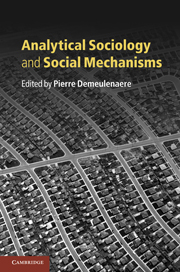Book contents
- Frontmatter
- Contents
- List of figures
- List of tables
- List of contributors
- Introduction
- Part I Action and mechanisms
- 1 Ordinary rationality: the core of analytical sociology
- 2 Indeterminacy of emotional mechanisms
- 3 A naturalistic ontology for mechanistic explanations in the social sciences
- 4 Conversation as mechanism: emergence in creative groups
- Part II Mechanisms and causality
- Part III Approaches to mechanisms
- Index
- References
3 - A naturalistic ontology for mechanistic explanations in the social sciences
Published online by Cambridge University Press: 05 June 2012
- Frontmatter
- Contents
- List of figures
- List of tables
- List of contributors
- Introduction
- Part I Action and mechanisms
- 1 Ordinary rationality: the core of analytical sociology
- 2 Indeterminacy of emotional mechanisms
- 3 A naturalistic ontology for mechanistic explanations in the social sciences
- 4 Conversation as mechanism: emergence in creative groups
- Part II Mechanisms and causality
- Part III Approaches to mechanisms
- Index
- References
Summary
A naturalistic ontology for mechanistic explanations
There are several approaches in the social sciences that seek to provide causal explanations of social phenomena neither in terms of general causal laws nor in terms of case-specific narratives, but, at a middle level of generality, in terms of recurrent causal patterns or “mechanisms” (Hedström and Swedberg 1998). Typically, these approaches invoke micro-mechanisms to explain macro-social phenomena. Most of them, “analytical sociology” in particular (Hedström 2005), are versions or offshoots of methodological individualism. These individualistic approaches either stick to the “methodological” in “methodological individualism” and leave aside ontological issues, or else they are also individualistic in the metaphysical sense and deny the existence of supra-individual social phenomena that cannot be analyzed in terms of the aggregation of individual actions (see Ruben 1985).
The ontological challenge to which individualism responds is that presented by holistic approaches that place the social on a supra-individual level of reality. Another possible challenge, coming not from above but from below, that is, from the natural sciences, is generally not considered. The individuals invoked in individualism are not so much the individual organisms recognized in biology as the individual agents recognized in common-sense ontology. Individual agency is taken as a primitive in this approach, rather than as a tentative construct that should be unpacked and possibly questioned by psychology and biology.
- Type
- Chapter
- Information
- Analytical Sociology and Social Mechanisms , pp. 64 - 77Publisher: Cambridge University PressPrint publication year: 2011
References
- 11
- Cited by



